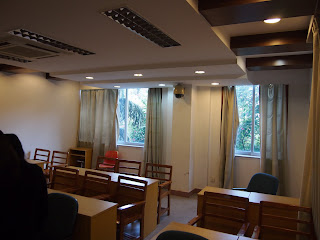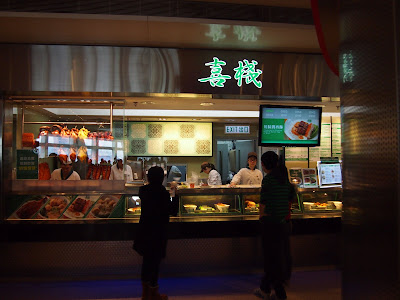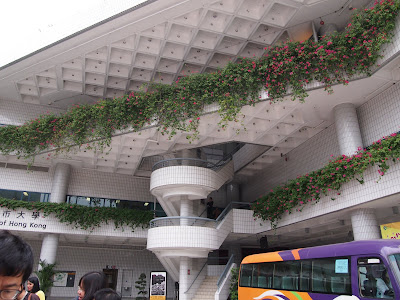
Zhousan! A colleague from Guangzhou, whom I met when I was working part-time at a Chinese restaurant when I was in high school in Tokyo, once told me, the congee in Guangzhou is "number one". I remembered what he said.
Well, although I'm sure that century egg and lean meat congee of this quality can be found easily in Hong Kong, and in Taipei if you look hard enough, but any random shop nearest to hotel can offer this quality is a sign that the level in Guangzhou is quite high!

Bought coffee at a bakery, and walked toward Sun Yat-sen University, venue of the conference. I spotted many foreigners.

Here I am at SYSU at last. There's a long story about SYSU and me. To tell you the truth, I once had a dream of studying there. It was the first Chinese university that I had heard of.
When I was in junior high, I became so obsessed with China that I started attending Chinese mass at Sophia University, hoping to learn some Chinese for free. There, I met Fr. Cochini, a French jesuit who spoke excellent Mandarin Chinese. He told me that he had taught French at SYSU in Guangzhou. That's how I first heard of the place.
Later, I became more interested in Cantonese than Mandarin. Back then in Japan, the easiest way to get in touch with Chinese culture was to watch hugely popular Hong Kong movies, of which I was a big fan. Those were all in Cantonese soundtrack with Japanese subtitles. Many of my classmates knew some Cantonese phrases from watching them. On the other hand, the only chance to hear Mandarin was NHK's Chinese courses. The strong Beijing-style rolled tongues and communist-style culture that went along with them put me off. (I somehow had an impression that most people who were learning Mandarin in Japan were left-wing people.)
So I started having a dream of going somewhere where I could learn Cantonese and Mandarin at the same time, and SYSU was such a place. (Back then, the idea of learning Mandarin in Hong Kong seemed a very bizarre one, even more so than learning English there.)
The first time I actively sought possibility of studying Chinese was when I was in the second year of university in the UK. In the UK back then, Chinese meant Cantonese. I looked into possibility of going to SYSU in Guangzhou. After all, I had an uncle who had studied at the Institute of Chinese medicine in Guangzhou, so it did not seem to be an outladish idea. However, I learned that foreigners had to pay a special rate in mainland China, and that the living conditions in dormitories in China were still not suitable for foreigners. Eventually, my friends from Hong Kong recommended going to Taiwan instead. Eventually, that's how I ended up in Taiwan.

I learned for the first time from Prof. Bolton that SYSU used to be the Christian College of Canton run by American missionaries. Interesting for me because my paper was about missionary schools teaching English in Taiwan.

Coffee shop. I really liked the building styles of SYSU, which were a combination of southern Chinese and western elements.

Signs in traditional characters. I thought the government had banned the use of the traditional in public signs...
Personally, I used to prefer simplified because it gave me less pain writing. But now that most writing are done by typing on computers, it makes no difference. Besides, the traditional seems to be aesthetically more pleasing.

Lunchbox provided by the conference was very nice. Not very cheap, it seemed. I liked it much better than western style conference food in Hong Kong. I like western too, but I don't have to eat it in Hong Kong and China.

Mandarin orange from southern Fujian, provided together with lunch. The culture is different from Hong Kong, even though it is so close geographically.

The signs are very clear and well-designed. It's good they spelt it "Yat-sen Road", instead of "Yixian Road"!

The school of Foreign Languages. Finally, I arrived at the venue of the conference. Pretty much the whole day was spent in the conference, which included the presentation of my own paper.
It was cool to listen to David Graddol in such a close distance, and his talk on languages in the Pearl River Delta was immensely interesting!
In the next post, I'll write about my "adventure" to the Sacred Heart Cathedral in Guangzhou, with the "remote control" from Wendy, a student at SYSU.
To be continued...












































